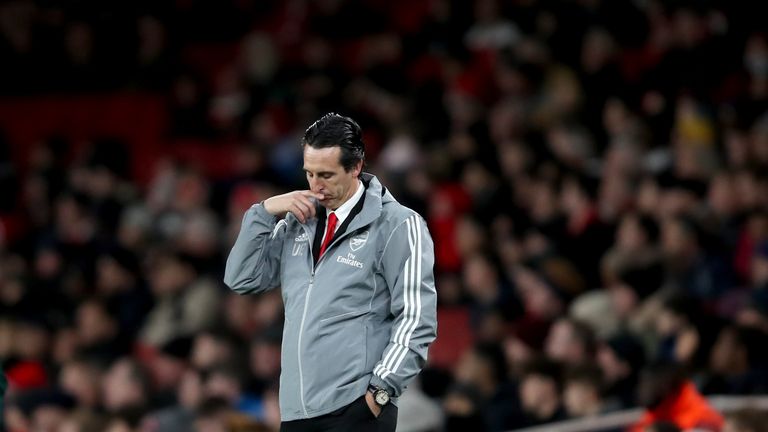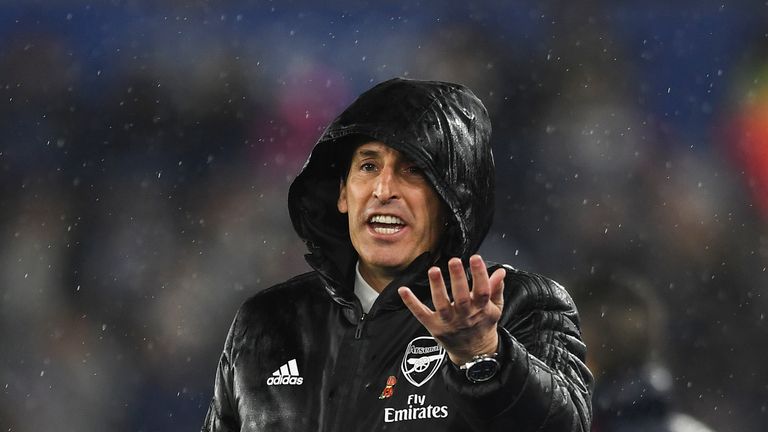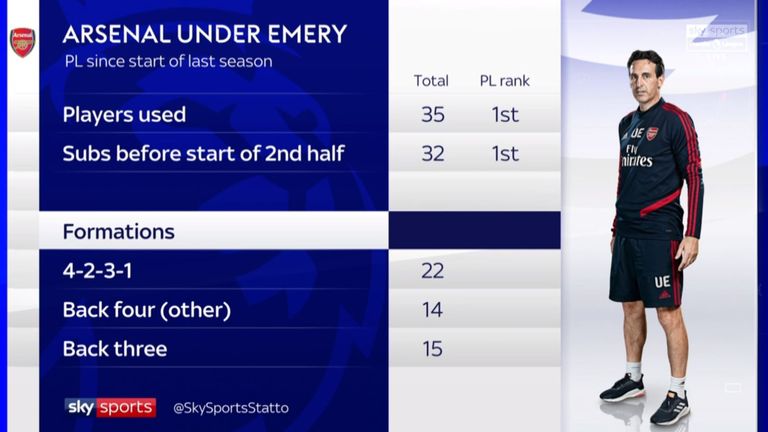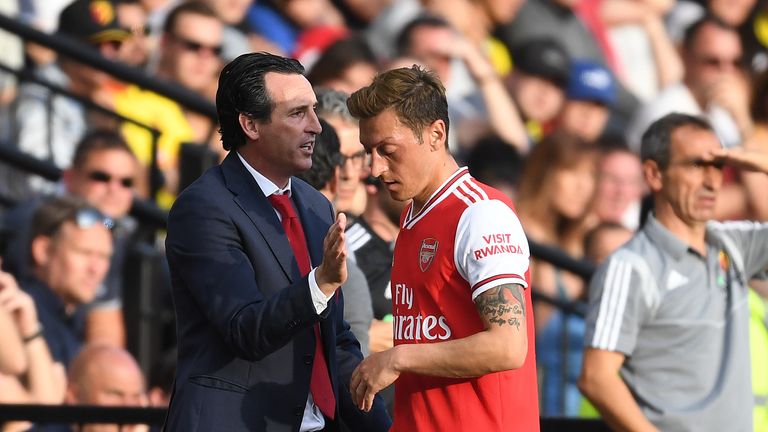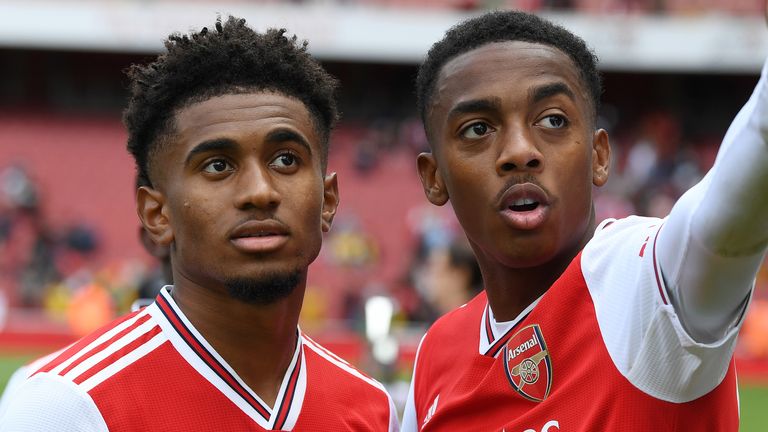Unai Emery sacked by Arsenal: Where did it go wrong?
Unai Emery promised pressing and "protagonism" when he arrived at Arsenal but the style was muddled and the plan unclear
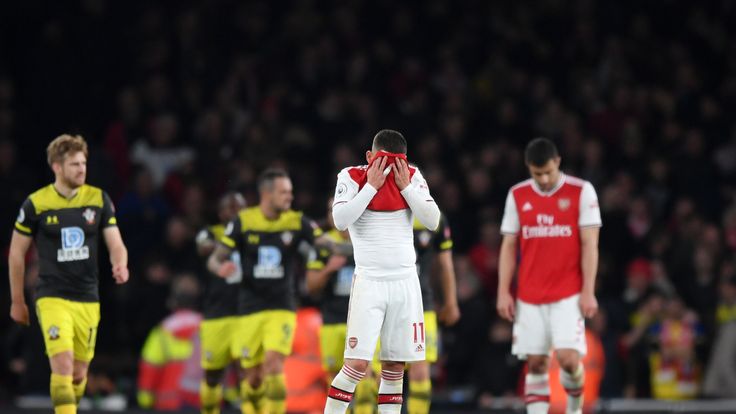
Friday 29 November 2019 15:55, UK
The axe has fallen on Unai Emery's tenure at Arsenal, but what did he get wrong?
Barely 18 months after taking over from Arsene Wenger, Emery's Arsenal project is over, and the Gunners' confused identity continues to be an issue.
The 2-1 defeat by Eintracht Frankfurt on Thursday night left Arsenal without a win in seven, their longest run since 1992.
Here, we run through the five things Emery got wrong at the Emirates...
- Arsenal sack Unai Emery
- Revealed: Who is on Arsenal's shortlist
- Arsenal fixtures | Premier League table
A muddled playing style
In August of last year, a few days before taking charge of his first game as Arsenal head coach against Pep Guardiola's Manchester City at the Emirates Stadium, Emery outlined his vision for the team and explained how he intended to change their approach.
"Our style with the ball is to be protagonists," he told Sky Sports, "to do things with combinations, to control the match with the positioning of the ball and then, when we have the space, to be aggressive going forward. Defensively, the first thing is to be organised and recover the ball quickly."
Emery lost that first game. He lost the next one too. But Arsenal's increased intensity and commitment to playing out from the back did at least provide evidence of the ideas he intended to implement. In the 3-2 loss to Chelsea, there was even a goal from an 18-pass move which started at the feet of Petr Cech and ended with Alex Iwobi firing home.
Arsenal emerged from those first two games with no points, but after years of drift under Arsene Wenger, it finally felt like they had a plan, the beginnings of a modernised approach which might eventually realign them with the elite. Fast forward to the final weeks of his reign, however, and it had become more difficult than ever to decipher what Emery actually wanted.
Arsenal were still playing out from the back, but they were not doing it either consistently or well. They lost possession in their defensive third 13 times during their 3-1 loss to Liverpool in August - the most by any side all season. It happened a further 12 times in the 2-2 draw with Watford in September and another nine times against Southampton on Saturday.
The pressing was there sometimes but altogether absent at others, and from one game to the next, it became impossible to predict what Emery would do next.
Pragmatism caused confusion
As his tenure continued, Emery increasingly began to preach pragmatism instead of protagonism, his desire for Arsenal to impose themselves on games replaced by talk of tailoring their approach week by week.
"We try to adapt to the demands of our opponents," he told Sky Sports in April, "to find the best way to approach each game with regards to our players, our system and our idea."
Emery's intention was to outsmart Arsenal's opponents, to negate their strengths and simultaneously exploit their weaknesses. But instead it appeared to have confused his own players, the chopping and changing coming at a cost of cohesion.
Emery's side showed counter-attacking threat against their top-six rivals - most notably in last season's meetings with Chelsea, Manchester United and Tottenham - but the suspicion grew that when the circumstances demanded something different, they tended to come up short.
Matters were not helped by Emery's inherent conservatism. He spoke about transmitting "energy, passion and the determination to win" in April, about "making the fans proud" and creating "hope and excitement" inside the Emirates, but there was precious little evidence in the final weeks of his tenure.
It often felt as though his priority was not to win, but to avoid defeat. He would rather defend a lead than build on it. It's why Arsenal so often lost impetus after going in front and it's also why, since Emery's appointment, and despite the attacking riches at his disposal, they have only won three Premier League games by a margin of more than two goals.
The divisive Xhaka and Ozil situations
Emery's approach to personnel seemed just as muddled and is best summed up by the situations of Granit Xhaka, who reacted furiously when he was booed off against Crystal Palace in October, and the out-of-favour Mesut Ozil.
Xhaka, already a deeply divisive figure among Arsenal supporters, faces an even tougher task to win them over following that show of petulance, when he walked off the pitch slowly, cupping his ear to the crowd and pulling off his shirt before storming down the tunnel. But there is no escaping that the situation was poorly managed.
In allowing the team to vote for their captain - reportedly the idea of a club psychologist - Emery surrendered much of his power and authority.
Though he reacted as such after the incident, Emery could have avoided it altogether had he taken Xhaka out of the firing line beforehand. He could have handed the captaincy to someone else. Or, at the very least, he could have avoided the needless delay in confirming the decision, a delay which turned the whole thing into a major story and added to the general sense of uncertainty surrounding the side.
He at least made a U-turn on Ozil in his final weeks, finally giving him a chance and referencing an improvement in training, but at that point it looked weak to many supporters. The unease had already festered for too long.
Problems with project youth
One positive of Emery's reign was his willingness to turn to young players. Matteo Guendouzi became a guaranteed starter following his arrival from Lorient in the summer of last year, while this season Joe Willock, Bukayo Saka, Gabriel Martinelli and Reiss Nelson have all had opportunities.
Again, though, there were question marks over how Emery used them.
He made six half-time substitutions this season, and five of those six saw an academy graduate make way. What will it have done for the confidence and development of Willock to have been hooked in consecutive games against Sheffield United and Vitoria Guimaraes, then left out of the squad altogether in Arsenal's next game against Palace?
At other times, Emery threw on young players just when Arsenal needed some steel. At Watford in September, his side were still 2-1 up when he chose to introduce Willock and Nelson in the space of 10 second-half minutes. Their youthful inexperience was obvious as Arsenal's slender lead was wiped out and two points were dropped.
Saka has produced some eye-catching performances since then, impressing on the left-hand side of Arsenal's attack against Manchester United at Old Trafford in late September, but the decision to move him into a central midfield role for the closing stages of the 1-0 loss to Sheffield United was a bizarre sight which invited further scrutiny.
What happened to Torreira?
Emery's use of Lucas Torreira raised more questions.
The Uruguay international arrived at Arsenal last year having become one of the most highly-rated holding midfielders in Italy with Sampdoria, ranking among the top-10 Serie A players for tackles, interceptions and passes in his final season there. One former coach described him as "tactically the strongest midfielder in Europe" after Sergio Busquets.
A string of eye-catching displays at the World Cup in Russia raised his profile further, and his early performances for Arsenal suggested he would go on to play a key role in Emery's side. Finally, it seemed they had found a player capable of filling a problem position, his terrier-like presence in front of the defence giving Arsenal something they previously lacked.
But then, almost inexplicably, Torreira appeared to fall dramatically out of favour with Emery. He has only started five Premier League games out of 13 this season, and he did not even make it off the bench against Sheffield United or Crystal Palace.
For all his pedigree and potential in the position, it seemed Emery no longer viewed Torreira as a deep-lying midfielder at all. On the rare occasions that he has played this season, the 23-year-old has generally operated further forwards. "He is very intelligent about getting space around the box and taking chances," explained Emery.
It seems Emery spotted something different in Torreira. But fans are entitled to wonder why, over a year after joining Arsenal, a player who has only scored four goals in his last 77 appearances for club and country was suddenly being categorised as a goal threat. It was another factor which added to the disorder of his final months in charge.
What's next for Arsenal?
Just two days after the dismissal of Emery, Arsenal will travel to Norwich on Sunday in the Premier League, live on Sky Sports. Kick off is at 2pm.

